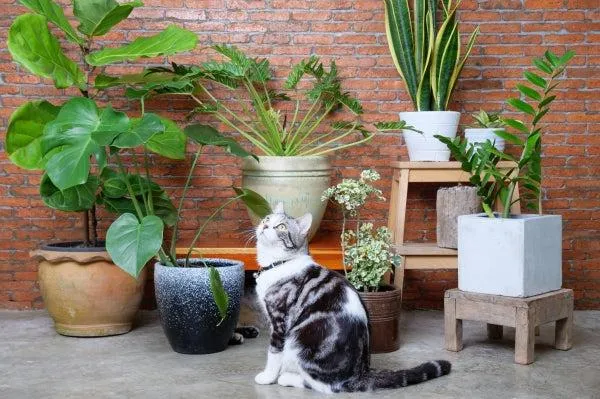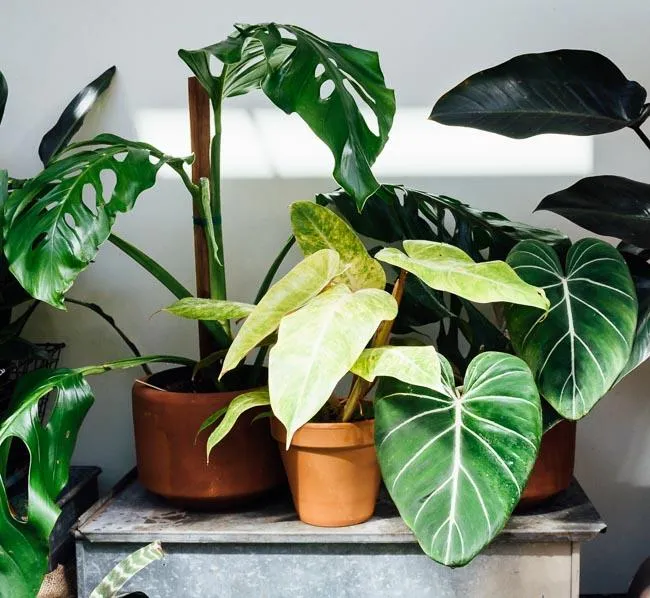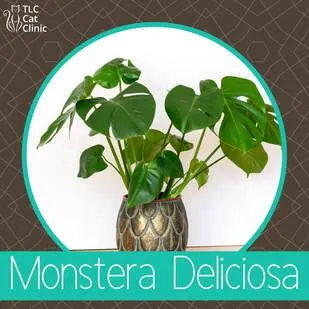Are Monsteras Safe for Cats? A Comprehensive Guide
If you have feline friends in your home and are thinking of adding a monstera plant to your indoor jungle, you may be wondering – are monsteras safe for cats? In this article, I’ll provide a detailed breakdown of the risks and benefits of keeping monstera around cats based on my experience as a plant parent and longtime cat lover.
Monstera Toxicity According to Experts
Let’s start with the facts. Most experts agree that while mature monstera plants are generally non-toxic to cats, some plant parts can potentially cause mild stomach upset if ingested in large amounts. The American Society for the Prevention of Cruelty to Animals (ASPCA) lists monstera under their “caution” category, meaning it may cause minor issues.
Specifically, the milky sap contained in monstera stems and leaves is thought to be mildly irritating if your cat chews on or ingests it. The sap contains insoluble needles of calcium oxalate that can cause oral irritation or temporary diarrhea if consumed.
However, the ASPCA also notes that there is little documented evidence of cats being intentionally poisoned by monstera alone. So while the plant may cause some tummy troubles, it would likely take a significant amount of ingestion to cause any serious health issues.
Monitoring is Key with Cats and Houseplants
From my experience owning both plants and cats, the biggest risks come down to supervision and cat behavior rather than the plant itself. Most healthy cats will avoid eating large amounts of plants, but kittens, sick cats, and especially curious or mischievous ones may nibble or chew more than they should.
The answer is not to avoid all plants, but to choose cautiously and monitor interactions closely. Keep an eye out for any signs your cat is interested in the monstera, such as pawing or smelling it. Provide plenty of other environmental enrichment like scratching posts, toys, etc. to keep your cat entertained and reduce plant attraction.

Baby Cat Cautions
Kittens tend to be more exploratory with their mouths than adult cats, so it’s best to introduce houseplants only once they are fully grown. In the early months, stick to non-toxic options or place all plants up high until chewing behaviors diminish.
I’ve found empty cardboard boxes or tubes make fun, temporary toys to distract kittens from plants. At the same time, getting them used to gentle petting of leaves from a young age helps socialize them not to see indoor flora as chew toys.
Monstera Safety Tips If You Choose to Keep One
- Locate the plant in an high-up, out-of-reach area. Most cats can’t jump as high as a mature monstera!
- Inspect leaves regularly for nibbles and remove any damaged or drooping foliage immediately.
- Use natural deterrents like tin foil, citrus peels, or upside-down bottle caps around the base if a curious cat starts to investigate.
- Consider a hanging planter or plant stand to raise it even higher from little paws and noses.
- Introduce cats slowly to new houseplants and supervise interactions at first.
Weighing the Rewards of Sharing Your Home with Plants and Pets
At the end of the day, there may always be a small risk with having any houseplants when cats are involved. But in my experience, the rewards of creating a living indoor ecosystem far outweigh shutting pets out of plant spaces entirely.
By choosing non-toxic or minimal-risk options like monsteras, monitoring all interactions, and taking precautions, it’s absolutely possible to have a green-thumb and a soft spot for furry friends. Both can benefit from exposure to natural elements indoors.
Many of my cat BFFs over the years have grown up completely ignoring or even protecting the peace lily from little paws. With patience and care on the owner’s part, the right precautions go a long way towards keeping both flora and fauna thriving happily at home.
Deciding What’s Right for Your Own Kitties
Ultimately, you know your cat crew best. If one has a history of compulsive chewing or eating plants, monsteras may not be worth the worry no matter where they’re placed. High-energy “fur-balls” might also pose more risks than a lounging lapcat.

Take your feline friends’ individual personalities into account. Try introducing any new plant babies when cats are calm and supervised at first. Watch how they react before fully entrusting them together unattended.
With time and care, cats and houseplants can coexist. But protecting curious kitties’ health has to come before any green desires. If uncertainty lingers, a reliable indoor succulent or pet-safe ficus might create less stress all around instead.
Final Thoughts on Cats and Monstera from My Home
In summary, mature monsteras have low toxicity potential according to experts. But minimizing access, supervising interactions, and considering each cat’s habits are key when allowing felines near any plant.
My two lovelies have never paid much attention to the monstera casually towering in the corner of our living room. I give it a quick inspection whenever repotting or watering just in case, but all is well year after year in our green-thumbed home.
Monstera risks seem minimal when handled sensibly. But your comfort level and individual kitty crew always come first. With care, many families find balance between botanical beauty and furry friend wellness indoors. The rewards can be remarkable on both sides when cared for jointly.
Is Monstera Safe For Cats?

| Cat Safety | Details |
|---|---|
| Toxicity | While monstera is not highly toxic, the sap can cause mild to moderate mouth irritation if ingested. |
| Cleanup | If a cat chews on monstera, wipe its mouth and paws with a damp cloth. Monitor for signs of irritation and contact a vet if symptoms appear. |
| Out of Reach | Keep monsteras and other houseplants up high or behind child gates to discourage unwanted tasting. Cats may be attracted to freshly unfurled new leaves. |
| Symptoms | Potential signs of toxicity include drooling, vomiting, and temporary mouth pain or swelling. More severe reactions are rare. |
| Safety Steps | Provide alternative chewing toys and scratching posts. Monitor plants closely when cats are present until deterrent habits are established. |
FAQ
-
Is a monstera plant poisonous to cats?
Yes, a monstera plant – also known as a Swiss cheese plant – can be toxic to cats if they ingest parts of it. The sap and leaf surfaces contain crystalline calcium oxalate, which can cause mouth pain or irritation if chewed or eaten.
-
What are the signs that a cat has eaten monstera?
Some signs that a cat may have eaten monstera include drooling, pawing or rubbing at their mouth, and reluctance to eat. They may also show gastrointestinal upset like vomiting. However, sometimes there are no obvious signs at all. It’s best to monitor your cat closely if you suspect they ingested part of a monstera plant.
-
Will a monstera plant hurt my cat if they just touch it?
No, simply touching or brushing against a monstera plant should not harm cats. The calcium oxalate crystals that can irritate skin and mouth are contained within the sap and surfaces of leaves, stems, and fruit. As long as your cat does not chew or ingest pieces of the plant, a casual contact is unlikely to cause issues.
-
How can I cats-proof my monstera plant?
To help prevent your cat from nibbling curious bites of monstera, you may want to put the plant up high where they cannot reach it as easily. You can also cover the soil with pebbles or decor to discourage digging. Monitor playtime if your cat is near the monstera to interrupt any chewing behaviors. At the same time, provide your cat with plenty of approved plants, toys and scratching posts to keep them occupied.
-
Can a large monstera plant still be hazardous if out of reach?
Even though a tall monstera may seem safely above ground, there is still some risk from fallen leaves, pieces broken off in play, or determined cats that learn to leap or climb. Therefore, any monstera kept indoors where a curious cat could possibly gain access to pieces should be considered potentially hazardous, whether within paw’s reach or not. It’s generally best not to have toxic houseplants if cats will have free run of the area.
-
Can monstera toxicity harm or kill a cat?
While a small bite may only cause mild mouth irritation, larger ingestions of monstera plant material can potentially cause more serious issues for cats like vomiting, drooling, and stomach upset. In severe cases where a very large amount is consumed, there is a risk of low blood calcium levels (hypocalcemia) which if left untreated can affect the heart and nervous system. Though uncommon, monstera poisoning has occasionally resulted in death. It’s wise to consider this plant off-limits for cats.

-
What are some safe alternative houseplants for cat owners?
Several popular houseplants that are generally considered non-toxic to cats include English ivy, ZZ plant, snake plant, peace lily, pothos or devil’s ivy, spider plant and bamboo palm. Speak to your local garden retailer or vet for their recommendations on low-risk plants suited to your home and feline friends. Remember, the best way to be certain is to simply keep all plants out of reach when cats are around!
